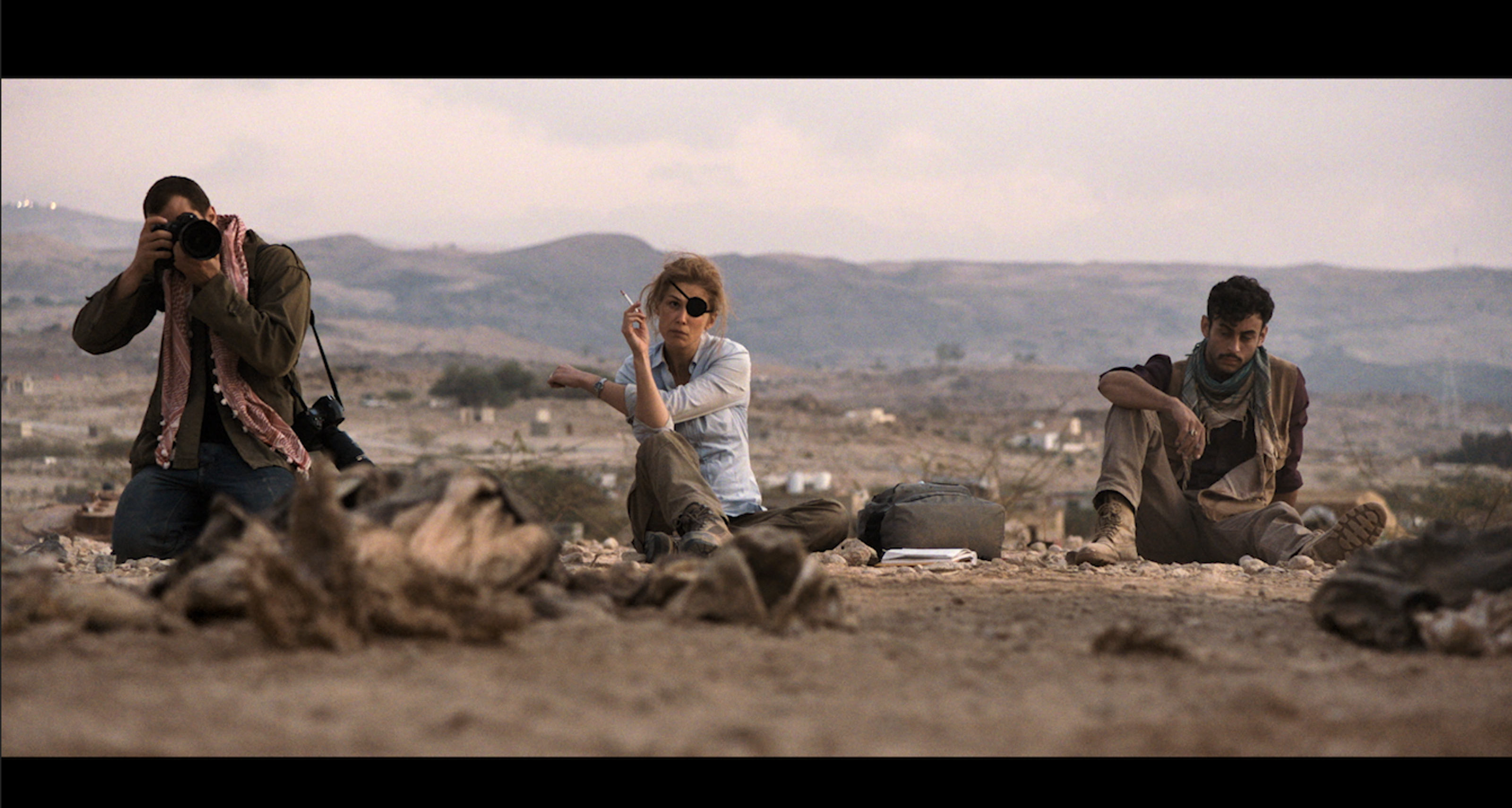Anyone who thinks the press are the enemy of the people needs to see A Private War. Marie Colvin, one of the greatest journalists of all time, gave up everything to tell the stories of the forgotten people, including anything resembling personal happiness. A Private War shows us the sh*tstorm Colvin put herself through to speak truth to power: brutal, dictatorial, cruel power.
A Private War gives us a glimpse of Colvin’s (Rosamund Pike) life from when she gets her eyepatch in Sri Lanka to her untimely death in Homs, Syria. The war correspondence with London’s The Sunday Times gives Marie purpose and insatiable drive, to cover the atrocities done by the powerful to the poorest people on Earth. There she meets a photographer, Paul Conroy (Jamie Dornan, minus the BDSM) who shares that same drive Colvin has, and the two capture pictures and stories from all the terrible war fronts. It’s at home where Marie threatens to come falling apart at the seams: openly fighting with her boss Sean Ryan (Tom Hollander), suffering extreme PTSD, and one night standing with several men like Tony Shaw (Stanley Tucci) her ex David Irens (Greg Wise) because she can’t hold down a stable relationship: the job beckons.
A Private War really tries hard to immerse you into the live of a war correspondent like Mare Colvin. As such, it feels a tad overdirected at times (like why do we need a ticking clock to her death?) to make sure the audience gets it. Early on, we see how clever and unafraid she is, tricking the soliders to letting her into the desolation with fake IDs and charm just so she can find the “best” story. The war footage is horrifying: it’s people staring into the deepest abyss of human behavior, callously destroying lives for power. This is Colvin’s gift however: she finds the saddest, most heartbreaking stories and captures them in writing while Paul takes those awful pictures for the world to see. Colvin has nerves of steel: when surrounded by a militia, she stands, shouting her journalism credentials, or willing to call out Muammar Gaddafi right to his face, surrounded by his armed guards who see him as a god. Libya. Afghanistan. Sri Lanka. Syria. Colvin has her name on all of these events, going back over and over again despite the perpetual danger and terror. It’s at home where Marie feels most scared. We see the horrifying images pop up over and over again to the point where she never has a moment’s peace despite the calm (this does get annoying moviewise). So she remedies and quiets the voices with alcohol and men. Her friends and colleagues judge her behavior, not understanding that despite her spiraling, Marie is completely in control and just needs a coping mechanism to keep the demons at bay. Famously, Marie says “Fear is for later,” further showing just how much she cares and wants the world to understand the private wars going on for the civilians during these political struggles.
Rosamund Pike, like the amazing woman she’s portraying, keeps A Private War from falling into melodramatic traps. Pike plays Colvin like Will Graham from Hannibal. She’s detached and sort of unknowable when she’s forced into normal society, mostly because she’s triggered on all sides by the PTSD she’s incurred. Pike adapts an acerbic tone to everyone that isn’t a colleague, keeping things funny so they don’t become sad. The only time she breaks down is to colleagues, and Pike plays those scenes like releases that help her forget her fears and move forward to the next tragedy to cover. In the field, Pike, like Will Graham, is the opposite: she’s fearless and icy to powerful people, and deeply empathetic of the commoners stuck in a terrible situation. Pike makes this tone switching come off naturally and effortlessly, further showcasing just how amazing a talent Marie Colvin was. Jamie Dornan is probably the surprise of the movie, giving Paul Conroy a younger version of Marie Colvin’s nerves of steel, and a foil for Rosamund Pike to bounce off of.
Watching politicians chastise the press and accuse them of wrongdoing clearly has something to hide. I hope the press corps digs deep, and finds that tenacity and fearlessness that Marie Colvin had, plunging eagerly into the worst of humanity to tell us about it so we can do something about it. And for all those journalists out there doing the necessary but horrifying work to make us care, I just want you to know that I see it, and hear it, and do care. Thank you for everything that you do, and I hope that instead of fear coming later, that peace for yourself comes later instead.

